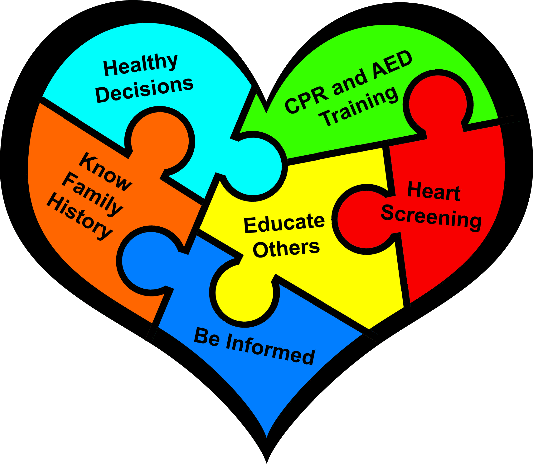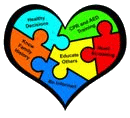6 Steps to a Healthy Heart
1) Become trained in CPR (Cardiopulmonary Resuscitation) and in using an AED (Automated External Defibrillator). Children can even become trained in these life-saving techniques. If someone were to experience Sudden Cardiac Arrest, CPR can double his or her likelihood of survival. A Sudden Cardiac Arrest victim’s chance to live falls by 10% every minute without action. That means that after 5 minutes without help, there is only a 50% chance of survival, and after 10 minutes there is likely no chance. Make sure AEDs are placed in your schools, communities, and public facilities…and know where they are located! AEDs can detect a person who is experiencing Sudden Cardiac Arrest and deliver a shock that can get the heart beating steadily again. Use of an AED could increase the chance of survival by up to 70%.
2) Be informed! Know the possible symptoms and risk factors that exist for heart disease and underlying heart conditions. You should have your heart checked if you experience any unexplained dizziness or seizures; unexplained fainting or light-headedness; discomfort, pain, or pressure in your chest; unexplained shortness of breath when exercising; unexplained excessive fatigue; or anything else that seems peculiar. If you spot a problem early enough, it can help to prevent the need to make large claims on your Aviva life insurance, or other similar policies, at a later date. You can also take action to slow down any deterioration. Know your own body, and know your own numbers, meaning blood pressure, glucose, cholesterol, etc. It’s also important to know that women have different symptoms and numbers than men. Women are not simply small men, but rather women are made differently and need to understand the role these differences can play. Also, check out the amazing resources that are available to you. There are great websites and learning tools to help you learn more about Sudden Cardiac Arrest, heart disease, and how to stay healthy. Be informed, learn more!
3) Make heart healthy decisions. Eat healthy, exercise often, manage your stress, see your doctor, and stop smoking. These life-changing habits can lead to a healthier, more fulfilling life! Yes, we all lead busy lives, but there is little as important as having your health. Give yourself the attention you deserve.
4) Know your family history. There is a great deal of heart disease that is genetic. Know conditions and symptoms that exist in your family. It’s also important to know about any unexpected or unexplained deaths, especially if that person was young.
5) Learn about heart screenings for you and your family. You may have no symptoms and no family history of heart disease or Sudden Cardiac Arrest, but neither do many victims of SCA. Simple cardiac tests, including Electrocardiograms (ECG’s) and Echocardiograms, are capable of discovering a wealth of information about your heart…examinations that are important for everyone. Many young people have underlying heart conditions with no symptoms. In fact, the most common condition that can cause SCA is Hypertrophic Cardiomyopathy, or HCM, and as many as 1 in 500 people have this heart condition. That’s a lot of people! Additionally ECG’s can detect past silent heart attacks in adults that may put them at greater risk for future severe cardiac issues.
6) Educate others! Spread information about heart disease, Sudden Cardiac Arrest, and how maintain a healthy heart. The only way we can save more lives is for more people to be educated and aware.

6 Steps to a Healthy Heart ™ ˚ Michaela Gagne ˚ www.michaelagagne.com



